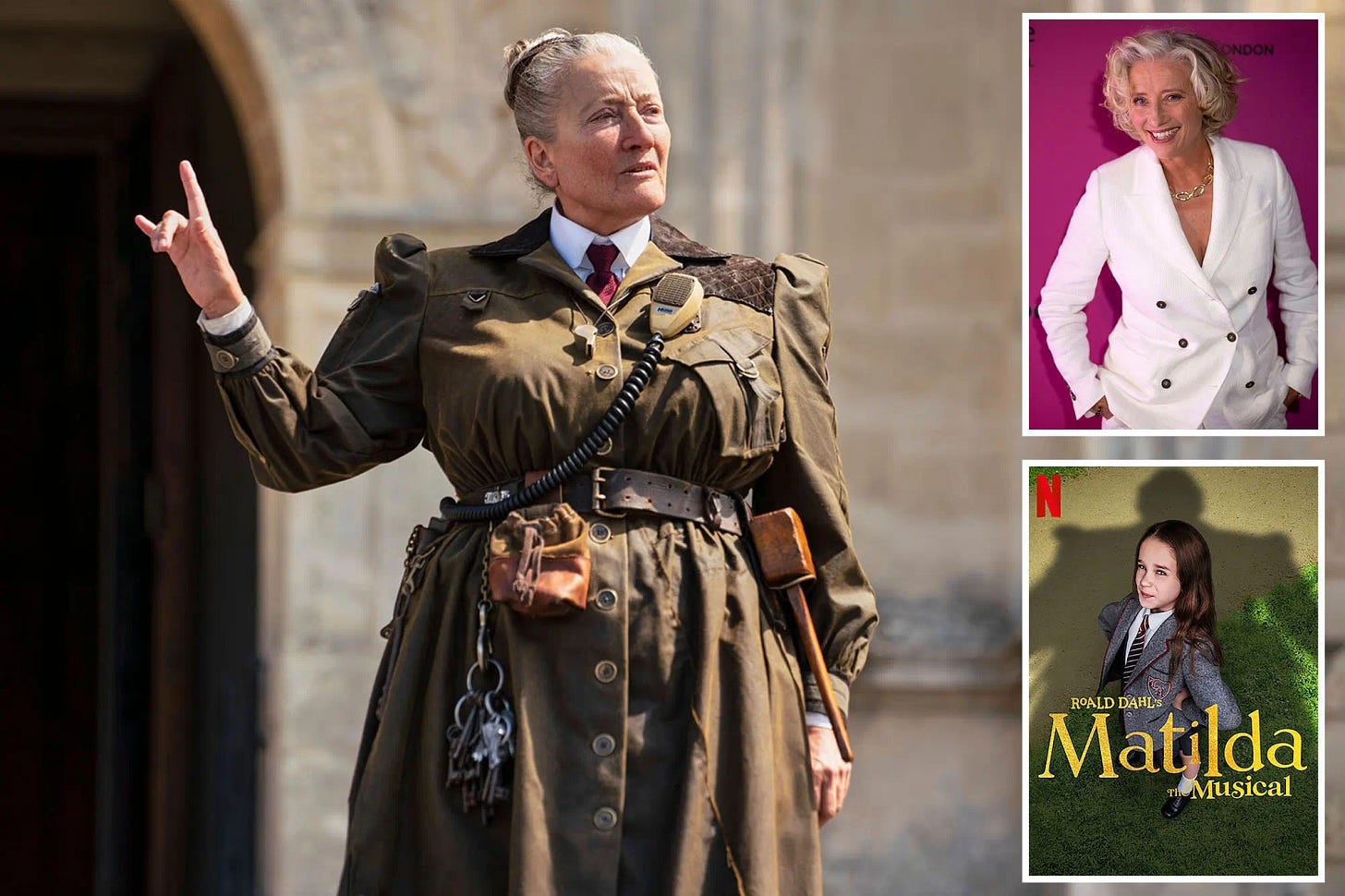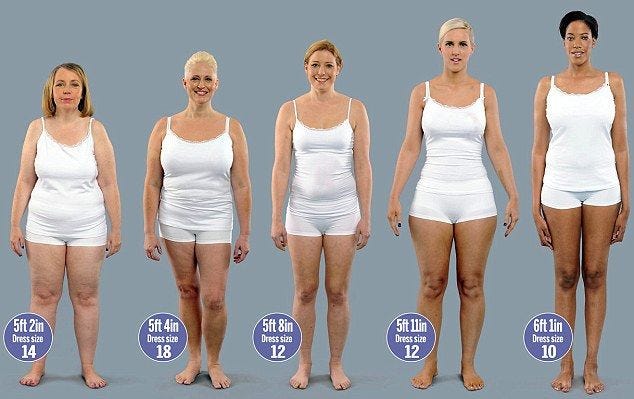
Content note: Description of body sizes, weights, weight loss.
There was some conversation last week about actor Emma Thompson donning a fat suit as Miss Trunchbull in the upcoming Netflix film, “Matilda the Musical.” Why, many people ask, do films and television continue to cast not-fat actors in roles where they have to wear padding to match the body shape of a character, when studios could just cast actors with that body shape?
I’m not wading far into that argument here. The people who currently exist in the type of bodies actors mimic by strapping on a suit of padding are entitled to whatever feelings, opinions, and arguments they have about this issue. There are seasoned comedic actors like Dot-Marie Jones or Bridget Everett—athletes with the Trunchbull shot putter swoleness; Dot-Marie was a shot putter!—who could nail the role. But I’m also never surprised (which doesn’t make it right) when Big Cinema/TV casts only the most famous actors in their properties. Netflix wants money and Emma Thompson’s a bigger name who brings it in. Maybe I just don’t expect any better from behemoth capitalist enterprises.
What struck me about this discourse was a headline from Metro UK: “Do we really need another skinny actress in a fat suit?”
My first thought: “Would I really describe actor Emma Thompson as ‘skinny’?” I wouldn’t, just as I wouldn’t describe myself as skinny. Skinny, to me, suggests minimal curves, no soft places to grasp, a totally flat stomach, very little musculature or fat. That’s not how Emma’s shaped, that’s not how I’m shaped, and that’s not how many of us are shaped. Not being skinny isn’t a failing. Neither is being skinny, but that headline reads to me like a light diss of the notion of a skinny body and an imperfect sorting of humans’ bodily diversity into a binary: You are either skinny or you are fat.
I’ve seen this before regarding research on the reduced effectiveness of emergency contraception for people over 155 pounds. Virginia Sole-Smith wrote in her Burnt Toast newsletter: “Why is it not common knowledge that emergency contraception might not work unless you’re thin?” Again, setting aside the important implications of the larger issue: Would I classify anyone who weighs under 155 pounds as “thin”? I wouldn’t. Just take a look at the image below of five women who all weigh 154 pounds—different body fat distribution and musculature, different curves and bulges, different dress sizes. I’d describe each of their bodies differently, and not all as thin, but I don’t exactly know what one word I’d use. This is the conundrum: Can we even accurately describe our bodies in just one word? Do we have the sufficient singular terms to fully capture our unique shapes, sizes, and composition?

“Skinny” is complicated for me. A handful of times, people have described me that way as I was losing or had lost a lot of weight. I’ve heard, “You’re getting so skinny!” or “Don’t get too skinny, now!” As I was growing up, I internalized like so many of us the message that being skinny was the goal. Skinniness has long been revered (still is, of course), so what am I griping about if people see me this way now? What am I, a sore winner? The thing is, people weren’t calling me skinny because I was actually skinny or lacked shapeliness, soft places, or body fat—it just meant, “You’re smaller than me,” or “You’re not what I’d describe as fat,” or simply, “You’ve lost weight.” It wasn’t about accuracy of description, it was about feelings and comparison to another body shape. It felt like people were saying, “Well, you’re not really fat anymore, so I guess what you are is skinny. What other body types could a woman have?”
I’ve also been meandering down the path of not thinking of “skinny” as a plaudit. For so long, “skinny” just meant “‘good’ body,” and I won’t pretend that I didn’t beam inside years ago when my body changed and people suddenly described me that way. “Skinny” wasn’t accurate, but it was congratulatory. I don’t want to see it as such. It’s irrational to me now to feel pride over an imposed description that doesn’t match how I think of myself. But so ingrained is the cultural conditioning of “skinny” that when my mother said I looked “so skinny” at my cousin’s wedding last year, I dismissed her with an “Oh, please…” but felt a twisted ping of satisfaction inside. Old habits die hard. Maybe I just want to kill them faster by rejecting this word that’s so bound up for me in the supremacy of one particular body type.
How would I describe myself, though? Nothing seems to quite fit. Average doesn’t fit because at a size 6 in most clothes and around 155 pounds, I’m a smaller dress size and a lesser body weight than the average U.S. woman. Athletic doesn’t work because even though I work out a lot and am obviously muscular from weight lifting, any person’s body can be athletic and anyone of any size can be an athlete. Parts of me are curvy, I suppose (butt, breasts) but I have narrow hips and far from an hourglass shape. I can’t get on board with describing myself as skinny or thin when I can still grab healthy handfuls of my stomach fat and have quads that could crush a watermelon (I like to think, I’ll get back to you). I tend to go with muscular, mainly because I’m compelled to uplift that as a shape women can be when for so long we were supposed to be slender or delicate or dainty.
If you’re not buff but not fat, but not skinny, but not curvy, or any combination of those or lack thereof, though, how do you describe yourself? Thinking of ourselves in terms of our clothing sizes can help some of us, but not all. Also in a recent Virginia Sole-Smith newsletter, she took a survey of her readership about how they identified: 47.7 percent of her readers identified as “straight-sized” (i.e., not plus-sized, but sometimes plus-sized means over a U.S. 12, sometimes a 14, sometimes a 16 or 18. Ask anyone who shops for women’s clothes how many different sizes they have in their closet. I’ve got everything from an absurdly vanity-sized 2 up to a 10/12; I somehow fit both extra-extra smalls and larges. What does being “a size 6” even mean?) and 45 percent “picked some flavor of fat.”
But, Sole-Smith wrote: “Lots of write-ins about the terminology around this, many of you feeling unsure how to identify.” I know “straight-sized” works for me in this context even if I can fit almost the entire spectrum of straight sizes, but if you’re sometimes a 12 or 14 and sometimes a 16 or 18, what works for you? Virginia writes: “And yes, ‘mid-size’ gets used as an alternate term for both ‘small fat’ and ‘mid-fat’ and that is confusing as heck.”
It seems many of us are feeling the pains of trying to pin body size and shape labels on ourselves. I know we really don’t have to most of the time. We can just exist with our popping muscles in one place and our fat rolls in another, with our thigh gaps and our jiggling underarms and so forth. We can be complex beings who don’t fit neatly into any one adjective as we move through our lives and the clothing racks. But as we see more and more discussions of body politics and need a shorthand for groups of people or types of bodies, we can’t exactly use the headline, “Do we really need another not skinny but not fat, curvy in some places but slender in another, sort of lean but sort of soft, maybe plus-sized sometimes but we can’t really tell actress in a fat suit?”
I have no answers. I’m only considering how limited our conception of body shapes and sizes can be, how subjective and incomplete these labels often are, and how our descriptions of our bodies are shaped by lifetimes of external influence, criticism, or affirmation. Ultimately each of us labels ourselves however we want. It’s when we try to label other people that we might slip into murky territory. I’m on board with the idea of all body descriptions being neutralized: Fat is just a descriptor like hair color or height. So is skinny or muscular or curvy or anything else. Just because these terms can be neutral, though, doesn’t mean we find them accurate or adequate. Given how many things at once our bodies can be—aesthetically, physically, symbolically—maybe one word could never be enough.
What word or description fits your body most, if you had to choose? Can you even choose, or do you want to? Let me know in the comments.




